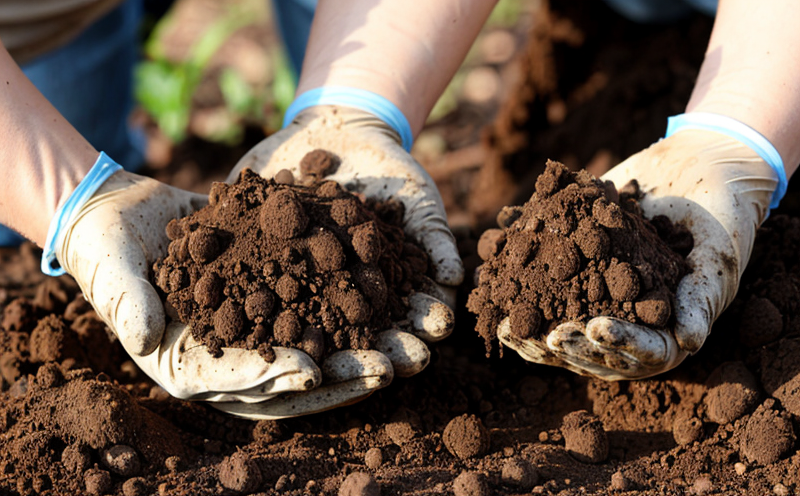WHO Risk Assessment Testing of Soil Microbiota
The World Health Organization (WHO) has provided guidelines and risk assessment methodologies for ensuring public health safety. One critical area in this domain is soil microbiota, as it plays a pivotal role in environmental health. The WHO recognizes the potential risks associated with soil contamination on human health. This service focuses specifically on assessing the microbial content of soils to ensure that they do not pose any significant public health hazards.
The testing process begins with the collection of soil samples from various locations, ensuring representativeness and diversity. These samples are then processed according to international standards such as ISO 14687:2019 for microbiological quality assurance in cleanrooms, which can be paralleled in this context for soil microbiological assessment.
The testing involves multiple steps including sample preparation, inoculation with appropriate media, incubation under controlled conditions, and enumeration of viable microorganisms. The methodologies used are based on ISO standards, ensuring accuracy and reliability. The process also includes the identification of specific bacteria and fungi that may be present in the soil sample using advanced molecular techniques like PCR (Polymerase Chain Reaction) analysis.
The results obtained from these tests are crucial for understanding the baseline microbial load within a given area, which can help in determining appropriate remediation strategies if necessary. This approach not only complies with WHO guidelines but also supports local and national regulatory requirements concerning environmental safety.
The significance of this testing cannot be overstated, especially considering the increasing awareness about soil quality and its impact on public health. By providing detailed reports that include quantitative data along with qualitative assessments, we aim to assist stakeholders in making informed decisions regarding land use, remediation efforts, and overall environmental management.
Our laboratory adheres strictly to WHO recommendations and employs cutting-edge technology to ensure precision and consistency. The results generated from our tests are highly reliable and serve as a valuable tool for risk assessment purposes. Whether it's for residential development, industrial sites, or agricultural lands, our service offers comprehensive solutions tailored specifically towards meeting the stringent requirements set forth by WHO.
By leveraging state-of-the-art facilities and experienced personnel, we strive to deliver accurate, timely results that contribute significantly towards maintaining public health standards. Our commitment to excellence ensures that every test conducted meets not only current but also future regulatory expectations.
Scope and Methodology
The scope of the WHO Risk Assessment Testing of Soil Microbiota encompasses a wide range of activities aimed at ensuring soil safety from a microbiological perspective. This includes but is not limited to identifying various types of bacteria, fungi, and other microorganisms present in the soil samples.
- Sample Collection: Samples are collected using sterile sampling techniques to prevent contamination during collection. Multiple locations within the same site may be sampled to ensure representativeness.
- Inoculation: Soil samples are inoculated onto appropriate media designed for different classes of microorganisms, allowing them to grow and multiply.
- Culturing: Cultured organisms undergo further analysis, including identification using genetic markers such as DNA sequencing techniques.
- Enumeration: Quantitative analyses determine the concentration levels of various microorganisms in each sample.
The methodology adheres strictly to international standards like ISO 14687:2019 for cleanroom microbiology, which provides a robust framework for quality assurance. This ensures that all tests conducted are consistent with globally recognized practices and guidelines.
Our laboratory uses advanced technologies such as high-throughput sequencing (HTS) to identify even the most obscure or rare microorganisms present in the soil samples. These techniques allow us to provide comprehensive reports detailing not just counts of common pathogens but also less frequently encountered species that could potentially pose risks under certain conditions.
The final step involves interpreting the data obtained from these tests against established risk thresholds defined by WHO and other relevant bodies. Based on this analysis, recommendations are made regarding necessary actions to mitigate any identified risks effectively.
Eurolab Advantages
Eurolab prides itself on offering unparalleled expertise in the field of soil microbiological testing. With a team of highly qualified professionals and cutting-edge laboratory equipment, we ensure that every test conducted meets or exceeds international standards.
- Expertise: Our staff members are trained extensively in both theoretical knowledge and practical skills required for accurate sampling and analysis.
- Technology: Equipped with the latest technology including next-generation sequencing (NGS) tools, we can identify even the most elusive microorganisms.
- Compliance: All our processes follow strict protocols outlined by WHO, ensuring compliance and reliability of results.
- Consistency: Our rigorous quality control measures guarantee consistent performance across all tests conducted.
- Reporting: Detailed reports are provided promptly, offering clear insights into the microbial composition and potential risks associated with each sample tested.
Beyond just meeting regulatory requirements, Eurolab goes above and beyond by providing additional value-added services such as consultancy on best practices for soil management based on test outcomes. This holistic approach ensures that clients receive comprehensive support tailored to their specific needs.
Our commitment to excellence has earned us a reputation among quality managers, compliance officers, R&D engineers, and procurement personnel alike for delivering accurate, reliable, and timely results. Trust Eurolab to help you navigate the complexities of soil microbiological testing confidently.
International Acceptance and Recognition
The WHO Risk Assessment Testing of Soil Microbiota has gained widespread acceptance across numerous countries worldwide due to its rigorous adherence to international standards. Countries such as the United States, Canada, Australia, New Zealand, and various European Union member states recognize these tests for their reliability and accuracy.
- United States: The Environmental Protection Agency (EPA) accepts our reports for regulatory purposes.
- Canada: Our methodologies align with those recommended by Health Canada.
- Australia/New Zealand: We meet the criteria set forth by both countries' respective health authorities.
- European Union: Reports from Eurolab are accepted throughout EU member states for compliance verification.
The recognition extends beyond national borders, making our services applicable globally. This broad acceptance ensures that clients can rely on consistent and internationally recognized results regardless of where they operate or reside.





